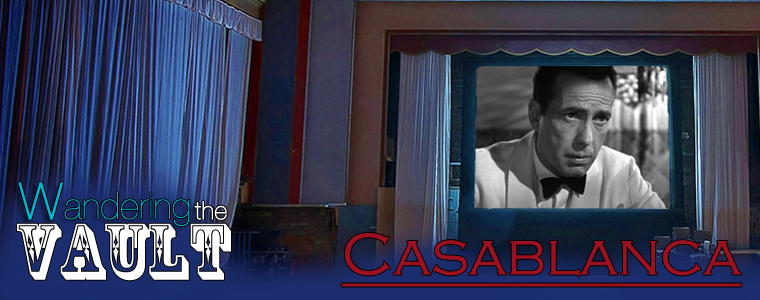The Best Movie Ever
by Andrew Collins
It’s impossible to watch a movie like Casablanca, which routinely tops “best-movie-ever” lists, without high expectations. It lives up to the acclaim, of course, but it did it in a way that surprised me: Casablanca is clever.
Yes, clever. In this case, it’s the stuff of greatness. Casablanca takes one of the most dominant male leads in cinematic history and surrounds him with a wonderful supporting cast that includes bumbling Nazis, a loyal-to-death crooner, a French patriot, corrupt local policemen, exiled Swiss businessmen, and so on. The result is an aura of ironic incompetence and hilarious hypocrisy.
Forget for just a moment the plot and the cinematography. Witty dialogue drives this 1942 drama like a well-oiled machine. It’s no wonder that so many great lines from Casablanca have been immortalized in cinematic history and have found a place in our everyday language. For example:
“I stick my neck out for nobody.”
“Here’s looking at you, kid.”
“Of all the gin joints, in all the towns, in all the world, she walks into mine.”
“I think this is the beginning of a beautiful friendship.”
I first highlighted the cleverness of Casablanca because it sets up the perfect backdrop to the real gem, which of course is the love story between Rick and Ilsa (Ingrid Bergman). It’s not simply the fact that two people fall in love, but all of the circumstances that surround it to create an unparalleled twist on the love story convention — a move that chick flicks have been seeking to capture ever since. Anyone can say, “kiss me as if it were the last time.” But when Ilsa, torn between two genuinely good choices of a long-lost lover and a husband with a cause, melts into Rick’s arms, I melted with her.
It’s the cruelest of circumstances pressed on a trio of very likable characters. Even though Ilsa is married and abandoned Rick years before, she only fell for him in the first place because of an honest mistake. I’ll avoid spoiling the mistake in case someone out there has been living under a rock, but suffice it to say that we have good reasons to sympathize with each lover. Nothing sparks a great story, after all, like a little misinformation and a sick twist of fate.
Of course, the lovers’ situation brings up plenty of questions. As an aloof, less-than-honest owner of a bar, Rick isn’t quite a pillar of virtue, so why is it so believable that Ilsa could still be in love with someone she only knew for a few days and hasn’t seen in years? Why do we believe that she’d let her husband fly away into history just so she could be with the owner of some bar in Casablanca? Why does she continue to love a man whose life motto is, “I stick my neck out for nobody”?
Because he’s Humphrey-freaking-Bogart, that’s why! Bogart simply dominates the film. From his first line to his last, he owns Rick Blaine, rising to a level of legend and likability that few other film characters have attained. In him, we find a wonderful blend of strength, scoundrel, confidence, and inner turmoil. He’s honest enough to like, selfish enough to be human, suave and handsome enough to fall in love with, and honorable enough to truly admire. He refuses to help one of his slimeball patrons escape from the Nazis, but rigs the gambling tables so that newlyweds can escape to America. He “sticks his neck out for nobody,” yet has friends who would die for him. He plays politics with all sides, but refuses to be bought off. What else could you ask for in a hero? It’s only a further testament to the genius of his character that he is just as appealing today as he was seventy years ago.
Like any older film, Casablanca doesn’t have the “spectacle” that we’re used to these days. The painted backdrops, model planes, and out-of-sync piano playing hardly impress, even for that time, but who cares? Casablanca has it where it counts — character and story — and that’s why it’s still good today.








